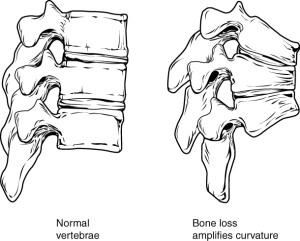- Calls to this hotline are currently being directed to Within Health, Fay or Eating Disorder Solutions
- Representatives are standing by 24/7 to help answer your questions
- All calls are confidential and HIPAA compliant
- There is no obligation or cost to call
- Eating Disorder Hope does not receive any commissions or fees dependent upon which provider you select
- Additional treatment providers are located on our directory or samhsa.gov
Anorexia and Osteoporosis Concerns

Osteoporosis has long been one of the most severe and frightening effects of anorexia, but there may be hope on the horizon. In a 2019 article in the Journal of Eating Disorders, Drs. Pratibha Anand and Philip Mehler report on the “only published case of a complete return to normal bone density following many years of severe osteoporosis in a severely malnourished patient.” [1]
According to the International Osteoporosis Foundation, “osteoporosis literally means porous bone and is a disease in which the density and quality of bones are reduced. As bones become more porous and fragile, the risk of fracture is greatly increased. The loss of bone occurs silently and progressively. Often there are no symptoms until the first fracture occurs.” [2]
The National Institute of Health reports that bone loss is caused by the restrictive eating and resulting malnutrition of anorexia, “Extremely low body weight in females can cause the body to stop producing estrogen, resulting in a condition known as amenorrhea, or absent menstrual periods. Low estrogen levels contribute to significant losses in bone density.” [3]
According to the article, “Osteoporosis recovery in severe anorexia nervosa: a case report” in the Journal of Eating Disorders, there has never before been a published report of a patient recovery normal bone health after a diagnosis of osteoporosis; until now.
The article by Drs. Anand and Mehler documents their work with “a patient with severe anorexia nervosa and osteoporosis dating back nearly 20 years” who “ultimately achieved a return to normal bone density in her late 20s.”
his is astounding, especially in light of the fact that she had been hospitalized nearly 100 times and had multiple stays in treatment settings. She was first diagnosed with osteoporosis when she was 14. During that time, she received bone scans every 1-2 years, which showed progressive deterioration of bone density until age 25.
 While there was a range of medical interventions used to address the patient’s decreasing bone density, including calcium supplements, estradiol patches, and progesterone, nothing appeared to make a significant difference in her bone density. In fact, she suffered a stress fracture in her foot and a rib fracture.
While there was a range of medical interventions used to address the patient’s decreasing bone density, including calcium supplements, estradiol patches, and progesterone, nothing appeared to make a significant difference in her bone density. In fact, she suffered a stress fracture in her foot and a rib fracture.
Not until doctors began a course of daily injections of teriparatide lasting two years did the patient see improvement. In fact, the results appear to be promising for anorexic patients with osteoporosis.
Drs. Anand and Mehler write, “The patient’s most recent DXA scan results…demonstrated bone density values within the normative range for age and gender.” They conclude, “This case report provides a modicum of optimism that, with judicious use of medication and with close monitoring of timely DXA scans, improvements of bone health can be achieved.”
REFERENCES:
[1] Anand, P., & Mehler, P. S. (2019). Osteoporosis recovery in severe anorexia nervosa: a case report. Journal of Eating Disorders, 7(1). doi: 10.1186/s40337-019-0269-8 [2] What is Osteoporosis? (n.d.). Retrieved January 13, 2020, from https://www.iofbonehealth.org/what-is-osteoporosis. [3] What People With Anorexia Nervosa Need To Know About Osteoporosis. (n.d.). Retrieved January 13, 2020, from https://www.bones.nih.gov/health-info/bone/osteoporosis/conditions-behaviors/anorexia-nervosa.About the Author:
 Travis Stewart, LPC has been mentoring others since 1992 and became a Licensed Professional Counselor in 2005. His counseling approach is relational and creative, helping people understand their story while also building hope for the future. Travis has experience with a wide variety of issues which might lead people to seek out professional counseling help.
Travis Stewart, LPC has been mentoring others since 1992 and became a Licensed Professional Counselor in 2005. His counseling approach is relational and creative, helping people understand their story while also building hope for the future. Travis has experience with a wide variety of issues which might lead people to seek out professional counseling help.
This includes a special interest in helping those with compulsive and addictive behaviors such as internet and screen addiction, eating disorders, anxiety, and perfectionism. Specifically, he has worked with eating disorders since 2003 and has learned from many of the field’s leading experts. He has worked with hundreds of individuals facing life-threatening eating disorders in all levels of treatment. His website is wtravisstewart.com
The opinions and views of our guest contributors are shared to provide a broad perspective on eating disorders. These are not necessarily the views of Eating Disorder Hope, but an effort to offer a discussion of various issues by different concerned individuals.
We at Eating Disorder Hope understand that eating disorders result from a combination of environmental and genetic factors. If you or a loved one are suffering from an eating disorder, please know that there is hope for you, and seek immediate professional help.
Published January 22, 2020, on EatingDisorderHope.com
Reviewed & Approved on January 22, 2020, by Jacquelyn Ekern MS, LPC

The EatingDisorderHope.com editorial team comprises experienced writers, editors, and medical reviewers specializing in eating disorders, treatment, and mental and behavioral health.

